Trending Now
We have updated our Privacy Policy and Terms of Use for Eurasia Group and its affiliates, including GZERO Media, to clarify the types of data we collect, how we collect it, how we use data and with whom we share data. By using our website you consent to our Terms and Conditions and Privacy Policy, including the transfer of your personal data to the United States from your country of residence, and our use of cookies described in our Cookie Policy.
{{ subpage.title }}
10 memorable quotes on GZERO World with Ian Bremmer in 2024
On our award-winning weekly global affairs show, GZERO World, Ian Bremmer explains the key global stories of the moment and sits down for in-depth conversations with the newsmakers and thought leaders shaping our world. In no particular order, here’s a look back at the 10 most quotable moments from this year’s episodes.
Adam Grant on how AI is changing the world of work
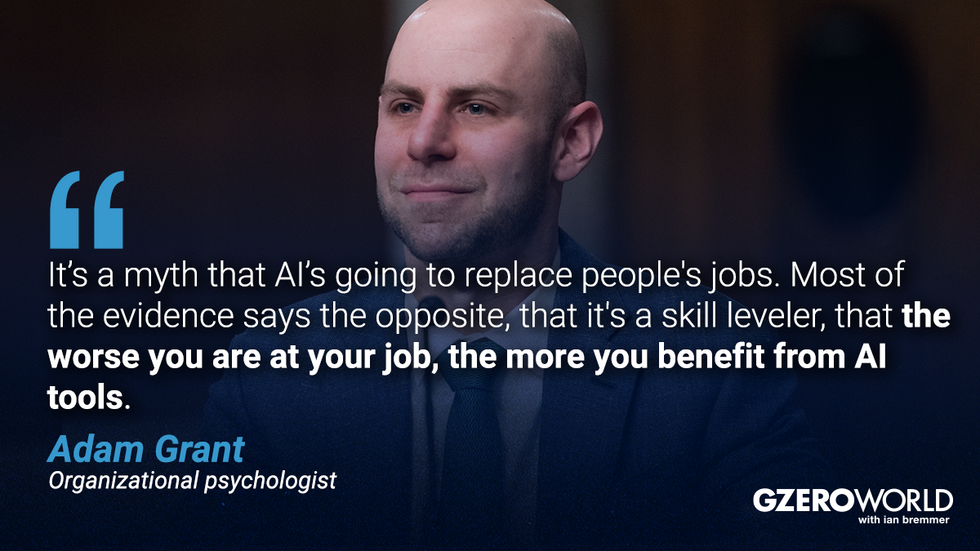
Aired on February 2, 2024
The AI revolution is coming… fast. But what does that mean for your job? Watch Ian Bremmer’s conversation with organizational psychologist Adam Grant.Yuval Noah Harari explains why the world isn't fair (but could be)
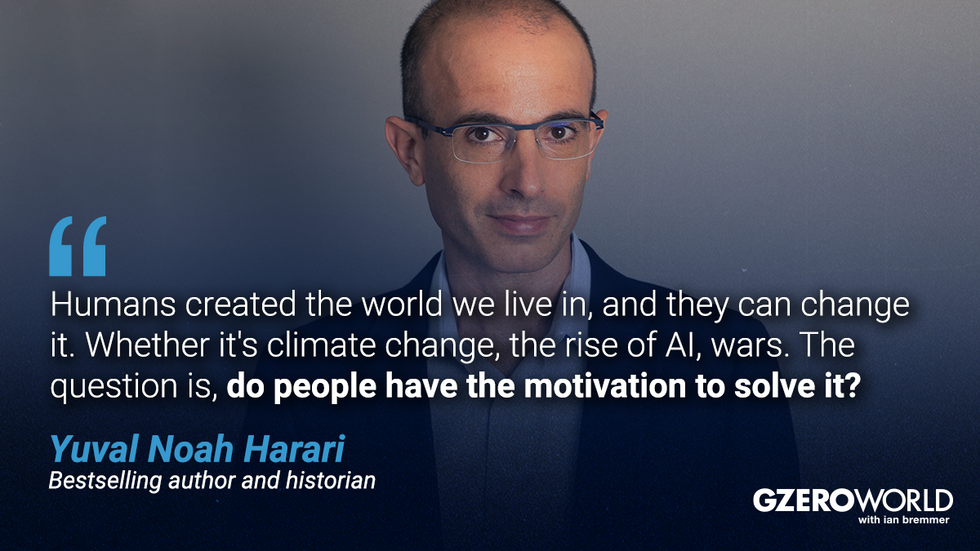
Aired on March 8, 2024
In a conversation filmed live at the historic 92nd Street Y in NYC, Yuval Noah Harari delves into the foundational role of storytelling in human civilization, the existential challenges posed by artificial intelligence, the geopolitical implications of the Ukraine war, and the most pressing questions of the Israeli-Palestinian conflict. Watch the full episode.Thomas L. Friedman on How the Israel-Gaza war could end - if Netanyahu wants it to

Aired on April 5, 2024
Pulitzer-prize-winning author and New York Times columnist Thomas L. Friedman games out a possible resolution to the war in Gaza and explains why both Israeli Prime Minister Netanyahu and Hamas are obstacles to peace. Watch the full episode.
Emily Bazelon on the major Supreme Court decisions of June 2024
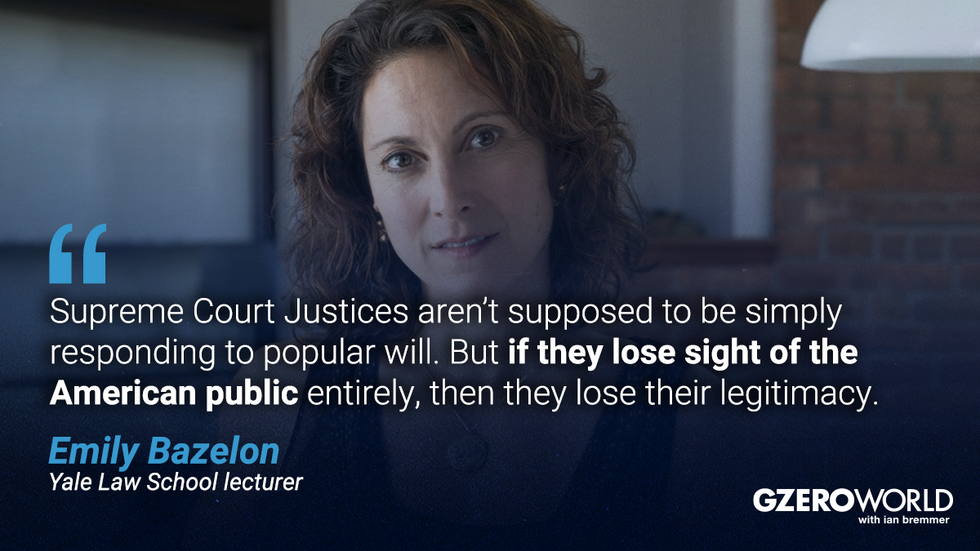
Aired on May 3, 2024
Yale legal scholar and New York Times Magazine staff writer Emily Bazelon unpacks some of the biggest cases that were on the docket this year and how the rulings will impact Americans. Watch the full episode.
Justice & peace in Gaza: The UN Palestinian ambassador's perspective with Riyad Mansour

Aired on July 5, 2024
Ian Bremmer sits down with Palestinian Ambassador to the United Nations Riyad Mansour for a candid interview about his role in the UN, the war in Gaza, and how it might end. Watch the full episode.
An exclusive interview with Argentina's radical new president, Javier Milei
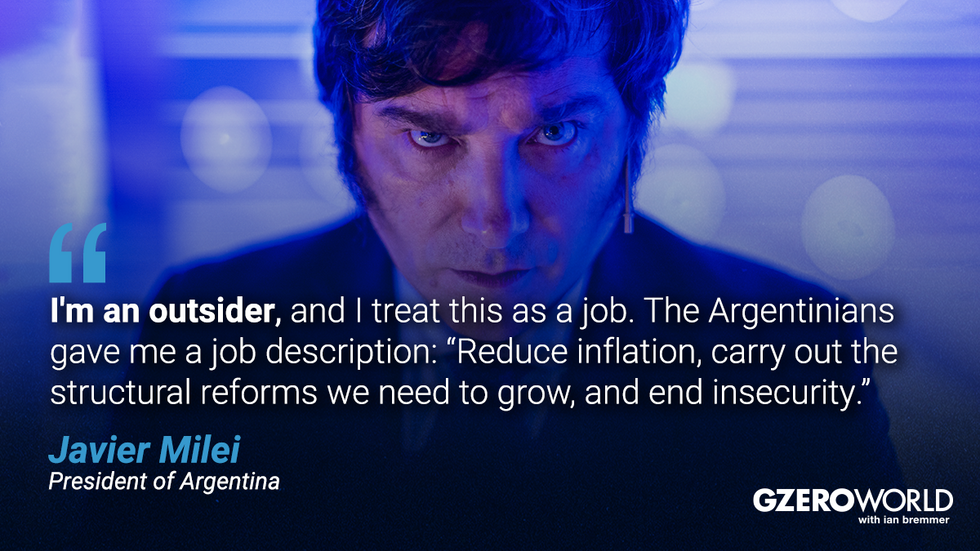
Aired on August 2, 2024
Argentine President Javier Milei defends his radical approach to saving Argentina’s struggling economy, his commitment to aligning with liberal democracies, and his pragmatic stance on international trade and alliances. Watch the full interview.
Why António Guterres believes the UN should lead on AI
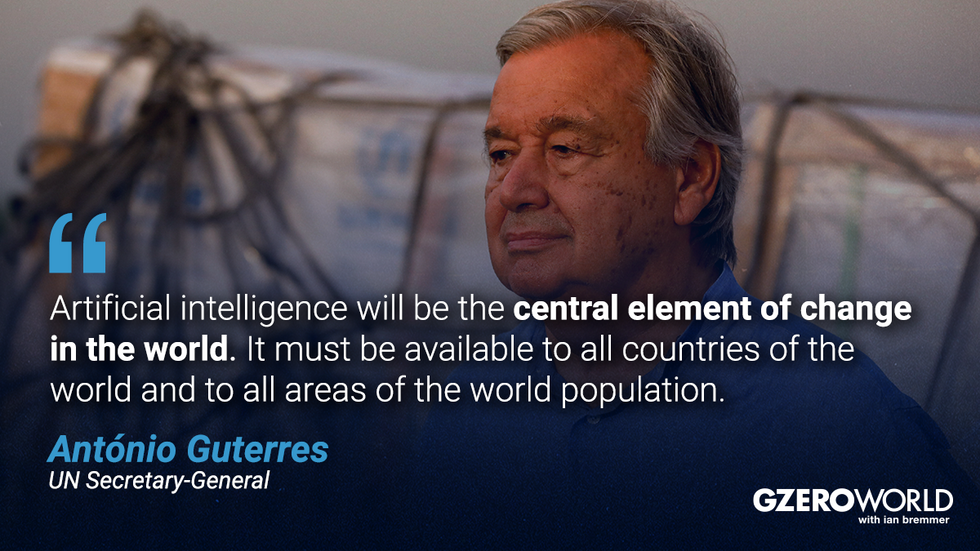
Aired on September 20, 2024
In an exclusive interview for GZERO World, United Nations Secretary-General António Guterres sat with Ian Bremmer on the sidelines of the UN General Assembly to discuss his vision for the future of the UN during his last term in office. Watch the full interview.
Iran's next move: Interview with VP Javad Zarif
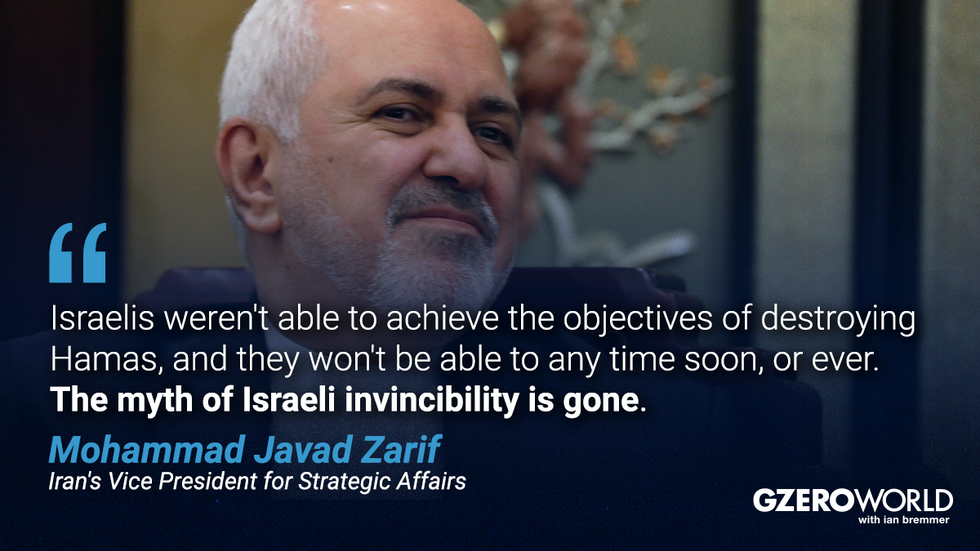
Aired on October 4, 2024
Ian Bremmer sits down with Iran's new Vice President for Strategic Affairs Mohammad Javad Zarif just days before the assassination of Hezbollah leader Hassan Nasrallah to discuss the escalating conflict in the Middle East and where Iran stands. Watch the full episode.
Roberta Metsola on whether Europe can become a global superpower
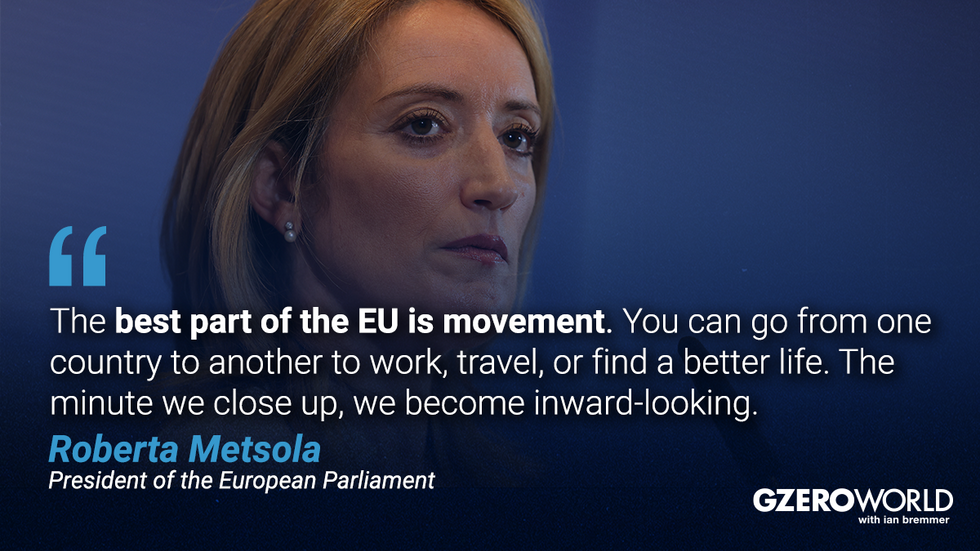
Aired on October 20, 2024
European Parliament President Roberta Metsola discusses Europe’s future amid an ongoing migrant crisis, the war in Ukraine, and an economic slowdown. Can the bloc’s 27 member states stay united? Watch the full episode.
Oren Cass on the case for Trump's tariffs
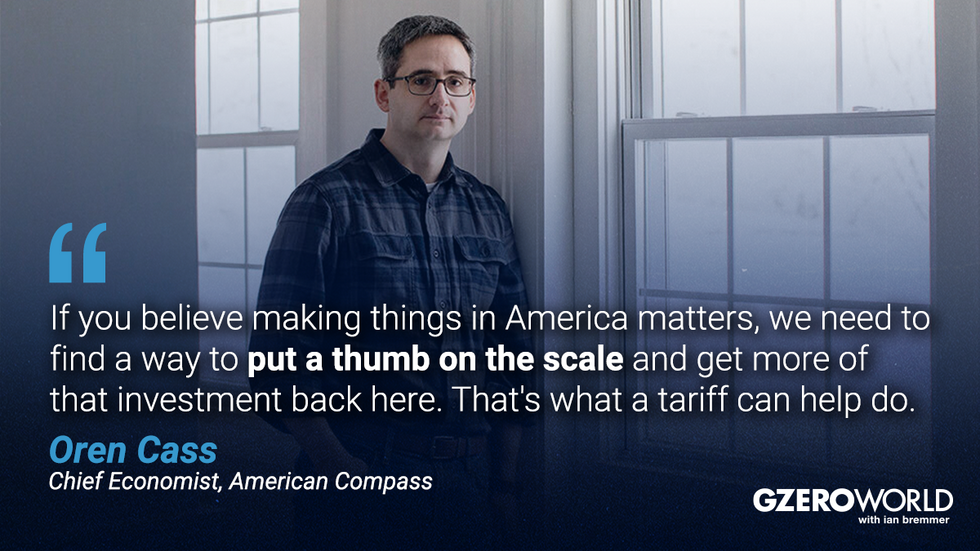
Aired on December 6, 2024
Trump has vowed to raise tariffs, slash business regulation, and deport millions of undocumented immigrants, policies he says will put Americans first. Oren Cass outlines what that will mean practically for workers and consumers. Watch the full episode.
Don’t miss an episode in 2025!
GZERO World airs nationwide on US public television (check local listings), and new digital episodes of GZERO World are released every Monday on YouTube.
The Supreme Court tackles homeless right to sleep outside
Is sleeping like breathing? Do Americans have a Constitutional right to sleep? In April, Supreme Court justices heard a case involving homeless encampments and whether cities that don’t provide shelter space can arrest or fine people for sleeping outside. At oral arguments, they asked philosophical questions about the idea of sleeping and whether or not providing space to sleep qualifies as “cruel and unusual” punishment under the 8th Amendment of the Constitution.
Legal expert Emily Bazelon joins Ian Bremmer on GZERO World to unpack some of the biggest cases before the Supreme Court this year. Former President Trump’s legal woes are front and center in the news, but many other major issues are at stake during this court term, including homelessness, gun rights, free speech on social media, and the power of federal agencies to interpret laws.
One case in front of the Court this year that isn’t generating a lot of headlines but will have a big impact on the daily lives of Americans involves the landmark 1984 Chevron v. Natural Resources Defence Council decision that provides the legal bases for government agencies like the EPA, SEC, and FDA to interpret laws how they see fit if they are ambiguous. At oral arguments, the Court’s conservative majority seemed skeptical of allowing the Chevron ruling as it stands to remain in place, which will fundamentally change the way the federal government operates.
“One way to think about these agencies is that they keep us safe. They make sure the water is clean and that the air is clean,” Bazelon explains. “Another way to think about them is they're intruding on corporate profits and taking up too much power.”
Catch GZERO World with Ian Bremmer every week on US public television (check local listings) and online.
Supreme Court will rule on abortion rights once again. What’s at stake now?
“The [abortion pill case] affects women across the country, it’s not state by state,” Bazelon stresses, “It’s the FDA’s authority to allow pills to be shipped everywhere and other rules that have made abortion pills more accessible for women in blue as well as red states.”
A group of doctors is challenging the Food and Drug Administration's authority to allow doctors to prescribe abortion pills without an in-person visit with a patient and for those pills to be sent through the mail. Bazelon explains that this group of plaintiffs is unusual in that they haven’t yet experienced direct harm from the FDA’s ruling, which you usually need to prove has happened before a case makes it all the way up to the highest court in the land. Four female justices are also on the bench this year, a historic high-water mark. Could that make a difference in the way justices rule on either case?
Catch GZERO World with Ian Bremmer every week on US public television (check local listings) and online.
- Podcast: (Un)packing the Supreme Court with Yale Law's Emily Bazelon ›
- Who polices the Supreme Court? ›
- Abortion in Florida: banned and on the ballot ›
- The Graphic Truth: Abortion laws around the world ›
- Why do Americans get so worked up about abortion? ›
- Should we rethink the global aging crisis? - GZERO Media ›
The US Supreme Court’s “upside-down” logic in Trump immunity case
2024 is certain to be a historic year for the US Supreme Court: In June, SCOTUS will issue rulings on former president Donald Trump’s immunity claims in charges brought by Special Counsel Jack Smith involving Trump’s attempts to overturn the 2020 election. Emily Bazelon joins Ian Bremmer on GZERO World to unpack the legal arguments at the heart of the case and what caught SCOTUS experts off-guard during oral arguments.
Like in the 2000 Bush v. Gore case that ultimately handed the election win to George W. Bush, Court watchers had expected the justices to issue a narrow ruling in the Trump case. But during arguments, the conservative justices asked questions that seemed more interested in raising hypotheticals about whether limiting the scope of immunity might restrict a president’s power too much. With Trump again on the ballot in 2024, the stakes could not be higher. Will the justices make a limited ruling or wade into the politics of the US presidential election with, as Justice Gorsuch put it, “a ruling for the ages”?
Catch GZERO World with Ian Bremmer every week on US public television (check local listings) and online.
- The case against Trump's big lie ›
- Trump's Jan. 6 trial could now hurt his re-election bid ›
- Is Trump immune? SCOTUS dives into uncharted waters ›
- Trump's immunity claim: US democracy in crisis ›
- Supreme Court divided over Trump’s absolute immunity claims ›
- How the Supreme Court immunity ruling changes presidential power - GZERO Media ›
The major Supreme Court decisions to watch for in June
In June, the US Supreme Court will begin issuing decisions on cases involving everything from reproductive rights to gun ownership to homeless encampments to former president Donald Trump’s criminal cases. Yale Law School Lecturer and staff writer at the New York Times Magazine Emily Bazelon joins Ian Bremmer on GZERO World to unpack some of the biggest cases on the docket this year and what’s at stake in some of the major decisions expected to come down next month.
This year’s SCOTUS term comes at a time when approval for the Court is at an all-time low. As of September of 2023, a record 58% of Americans disapproved of how the Court handles its job. That follows multiple ethics scandals involving Associate Justice Clarence Thomas and a string of conservative decisions, including the 2022 Dobbs decision striking down the right to abortion, increasingly out of step with public opinion. With the Court wading into the 2024 election and former President Trump’s immunity claims, it risks being seen by the public as even more partisan and politicized.
“As an American, I want to have a good faith belief in the justices’ approach,” Bazelon says, “After a certain number of cases come out in particular ways, you start to feel like cynicism is realism about the Court."
Catch GZERO World with Ian Bremmer every week on US public television (check local listings) and online.
The US Supreme Court, less trusted than ever, votes on major cases in June: Emily Bazelon on what to expect
Listen: It’s a big year for the US Supreme Court. In June, SCOTUS will begin issuing decisions on a number of politically charged cases, including abortion rights, gun control, and whether former president Donald Trump will stand trial for criminal cases, just as the 2024 election season shifts into high gear. Yale Law School lecturer and staff writer at The New York Times Magazine Emily Bazelon joins Ian Bremmer on the GZERO World Podcast to unpack some of the biggest cases on the docket this year, what's at stake, and what expected rulings will mean for the future of our democracy. This year’s term comes as public approval for SCOTUS hit a record low. The Court is facing accusations of politicization following ethics scandals involving Justice Clarence Thomas and a string of decisions from the conservative majority that advanced Republican policy goals, such as striking down the federal right to abortion. The Court was designed to remain above the political fray, but with the stakes so high in a presidential election year, does it risk being seen as just another partisan institution?
Subscribe to the GZERO World Podcast on Apple Podcasts, Spotify, or your preferred podcast platform, to receive new episodes as soon as they're published.
Who cares if the Supreme Court justices like each other?
Yale legal scholar and New York Times Magazine staff writer Emily Bazelon wants to have faith in the Supreme Court. "I want to have a good faith belief in the justices' approach to these cases” she tells Ian Bremmer in a new episode of GZERO World. But in a wide-ranging conversation in which Bazelon and Bremmer preview the major cases facing the Supreme Court this spring, Bazelon confesses that the past few years have tested her faith.
“After a certain number of cases come out particular ways, you start to feel like cynicism is realism about the Court."
And Bazelon is not alone. Public faith in the Supreme Court is at record lows, thanks to its rightward tilt and ethical questions surrounding the conduct of Justice Clarence Thomas. And that’s a problem, Bazelon says, not just for America but for the justices themselves. “They all have an incentive to protect the institution, the liberals as well as the conservatives. They don't want to see Americans lose total faith in the Court. That's not good for them and their job security and their collective legacy.”
But do the justices themselves get along? Bazelon couldn’t care less. “I'm personally mystified why they think we should care about that. I don't care whether they can be nice to each other when they're having lunch, whether they're collegial. I care about whether American law is going in a direction that makes sense to most Americans.” But at a time when the country itself could not be more divided, could collegiality in the highest court of the land be just the thing that Americans cling to?
Watch the full interview with Emily Bazelon on GZERO World with Ian Bremmer on US public television beginning this Friday, May 3. Check local listings.
Catch GZERO World with Ian Bremmer every week on US public television (check local listings) and online.
- Supreme Court divided over Trump’s absolute immunity claims ›
- US Supreme Court ends affirmative action in college admissions ›
- Why Clarence Thomas has eroded trust in the US Supreme Court ›
- US Supreme Court upends Roe v. Wade ›
- Ian Explains: Does it matter if Americans don't trust the Supreme Court? - GZERO Media ›
- The major Supreme Court decisions to watch for in June - GZERO Media ›
- The US Supreme Court, less trusted than ever, votes on major cases in June: Emily Bazelon on what to expect - GZERO Media ›
Why Clarence Thomas has eroded trust in the US Supreme Court
Few Supreme Court Justices have tested the Court's ethical limits like Justice Clarence Thomas, says this week's GZERO World guest, Yale Law School legal expert Emily Bazelon. And that's because, for centuries, Justices have been reluctant to test the boundaries of an ethical system that has few limits. "Federal judges and lower courts are subject to ethical codes," Bazelon explains, "but not the Supreme Court justices themselves."
As a result, the Court has experienced some of its lowest public approval ratings in history, this past year. Some of that discontent, of course, can be traced to the Court's rightward swing under its conservative supermajority. But for a branch of the government that relies heavily on public trust to ensure that its rulings are respected and carried out, the decline in popular support is cause for concern.
"People do not have faith that this is a non-political institution, and that's what courts are supposed to be, at least in theory. They're supposed to be doing something called law, that's separate from politics."
Tune into GZERO World with Ian Bremmer on US public television stations nationwide. Check local listings.
For more on the Supreme Court and what to expect from anticipated rulings this year, watch this episode of GZERO World with Ian Bremmer: "Who polices the Supreme Court?"
- Who polices the Supreme Court? ›
- Senators want ethics rules for SCOTUS ›
- Bharara: Clarence Thomas' donor trips may not be illegal, but not a good look ›
- Who cares if the Supreme Court justices like each other? - GZERO Media ›
- Ian Explains: Does it matter if Americans don't trust the Supreme Court? - GZERO Media ›
- The major Supreme Court decisions to watch for in June - GZERO Media ›
- The US Supreme Court, less trusted than ever, votes on major cases in June: Emily Bazelon on what to expect - GZERO Media ›
- US election disinformation: How myths like non-citizen voting erode public trust - GZERO Media ›





